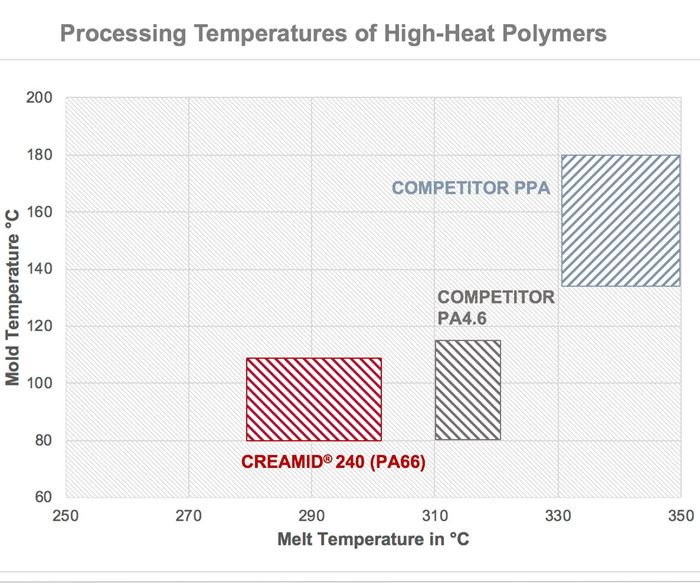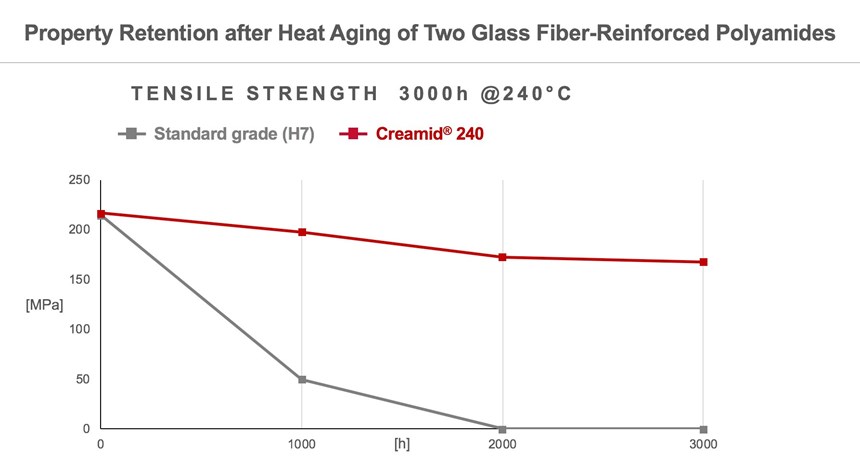Materials: High-Heat Glass-Reinforced Nylon 66 Compounds Outperform Comparable Nylon 66
Teknor’s new Creamis 240H7.5 can replace costly specialty polymers like PPA.
A new series of high-heat glass-reinforced nylon 66 compounds is said to bridge the cost-performance gap between standard heat-resistant nylons and costly specialty polymers, providing injection molders with a more economical alternative for automotive and other metal-replacement parts. The Creamid 240 H7.5 Series from Teknor Apex Company, Pawtucket, R.I., will be launched at Fakuma 2018 in technical talks at the company’s booth (B2-2114).
These compounds boast strength and stiffness of highly glass filled engineering polymers while maintaining high levels of critical mechanical properties even after continuous service at temperatures of 240 °C/464 F. Currently available grades, with glass fiber content of 35, 50, or 60%, exhibit dramatically improved property retention in comparison with similarly glass-filled standard nylon 66 compounds. At the same time they cost around 30% less per kilogram than high-performance polymers such as polyphthalamide (PPA) or nylon 4.6, while providing comparable performance.
Said Dr. Hartmut Elsässer, global director of technology for engineering thermoplastics, “Additional cost savings with Creamid 240 H7.5 compounds are achievable in processing. These new materials exhibit lower melt and mold temperatures than competing nylon 66 compounds and high-performance products like PPA, providing economies in terms of energy consumption, cycle times, and tooling requirements.”
While the new compounds have processing temperatures in the range of 280 to 300 °C/536 to 572 F and mold temperatures of 80 to 110 °C/176 to 230 F, the corresponding ranges for PPA or nylon 4.6 are 330 to 350 °C/626 to 662 F and 130 to 150 °C/266 to 302 F. The company recommends Creamid 240 H7.5 compounds for automotive under-hood components such as charge air cooler end caps, air intake manifolds, quick-fit connectors, radiator end tanks, turbo air ducts and resonators, oil pump wheels, EGR valves, and thermostatic casings. Other possibilities include electronic connectors, diode carriers, and bobbins, as well as consumer products such as lamp sockets and connectors.
Related Content
-
Design Optimization Software Finds Weight-Saving Solutions Outside the Traditional Realm
Resin supplier Celanese turned to startup Rafinex and its Möbius software to optimize the design for an engine bracket, ultimately reducing weight by 25% while maintaining mechanical performance and function.
-
Injection Molded Enclosures Plug into Potential Electric Vehicle Battery Applications
In partnership with material suppliers, Engel is proving out injection molded thermoplastic-based concepts for electric vehicle battery housings, utilizing production tools and dedicated machines at its large press factory in St. Valentin, Austria.
-
Injection Molded Tape and Resin “Sandwich” Technology Debuts
During its Mobility Days in Austria, Engel and KTM Technologies debuted an all-plastic molded motorcycle seat base produced via a tape-sandwich process that can run in a standard molding process.














